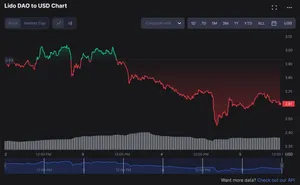The Metroverse NFT-based game caught the end of the 2021–22 crypto bull market, minting the Genesis collection in January 2022. The project sold out quickly, netting the project creators 2,000 ETH (~$6.3 million) from the mint alone, not to mention 5% royalties on the 25,361 ETH in trading volume since. The project promised to deliver a "land trading NFT strategy game" with mechanics they said would be "similar to Sim City", and flashy artwork drew in an excited fanbase.Ultimately, the project delivered a game that was a far cry from Sim City, and which only a small subset of players designated as "leaders" could even play. As interest in NFTs and crypto prices began to fall, the community became increasingly dissatisfied with the project creators, who they felt had delivered a subpar game, engaged in an additional cashgrab mint, and took actions like performing a reverse-split of the token which they believed harmed secondary market prices.
Tensions emerged between the project team and the community, with the project team dismissing all criticism as "FUD" and accusing their community members of "sabotage", and community members accusing the project team of rug-pulling and failing to listen to feedback. The team shut down the project Discord, claiming that the community was only making it harder for them to do what they had promised to do, and saying that the attacks were damaging to their mental health. The team promised to complete the last item on the roadmap, but stated that they would not be continuing to develop the project or add additional roadmap items due to the current NFT markets and the "non-stop attacks from the community".
Very shortly after closing the Discord, the project team changed their mind and announced that they would be closing the project entirely. They announced that the upcoming battle would be the last available to play, but that they would be airdropping tokens to players as promised in the last item on the roadmap, and open-sourcing the code. Multiple project team members deleted their social media, and project AMAs were wiped from the Metroverse YouTube channel.
These gestures were far from enough to satisfy an angry community, some of whom threatened to dox the anonymous team behind the game or take legal action against the founders. The team themselves fired back with legal threats, contacting community members to tell them that they believed their conversations on a separate Discord server involved illegal activities that are "not only morally reprehensible but may also constitute serious criminal offenses".
Some community members claimed to have spent tens of thousands of dollars on the project. "I spen[t] like 25 eth at 3k" wrote one. "I spen[t] 250k" shared another.





![Tweet by BNB Chain: "The grand prize winners of our third track, Lifestyle in #Web3, is the wonderful team Chatcasso 🥇
Chatcasso is a guided platform that allows users to easily and conveniently mint NFTs using only text input through the use of AI technology.
[9/11]"](https://primary-cdn.web3isgoinggreat.com/entryImages/resized/bnb-chain-hackathon-tweet_300.webp)







































